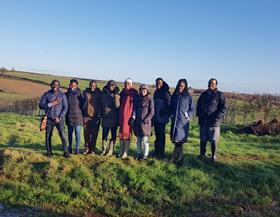
Agricultural Development students from across Africa and Asia have visited a large mixed farming enterprise in Rutland as the first of several farm trips organised for them by the Marshal Papworth Fund.
The nine students, who were selected for a scholarship by the agricultural development charity, were hosted by Percy, Tre and Tom Gilman, who run a profitable and sustainable arable and sheep farm.
The farmers explained how they incorporate conservation work through environmental schemes, set up a robust business structure, and work with technology such as RTK (real-time kinematic) and GPS.
The visits will complement the students’ scholarship-funded Masters studies in the UK. The nine students are currently studying for their Masters degrees at Cranfield University, Harper Adams University, Reading University and Writtle University College, as part of the Marshal Papworth Fund’s intake of scholarship students.
This year, the fund is welcoming its first students from Vietnam and Botswana, extending the reach of its work.
One of this year’s Marshal Papworth scholarship recipients, Charles Kabena from Malawi, a Reading University MSc Communication for Development student, said: “We are very grateful to the Gilman family for giving us their time and such an all-encompassing learning experience, which helps us understand how we can help our communities take their production to a commercial level alongside a sustainable approach to wildlife conservation.
“The opportunity to see first-hand many of the theories that we are covering in class is also invaluable to our studies and will allow us to make a stronger impact when we return to our home countries.”
Percy Gilman, who is a Royal Agricultural University graduate, explained to the students: “For any hope of a successful farming business, my advice to all of you would be to get the business structure right before you do anything else, it is absolutely essential if you want it to be not only profitable but to grow.”
Tom, who is also an RAU graduate, added: “We have a heavy involvement in stewardship schemes here, initially in the old Countryside Stewardship Scheme and now in the Mid-Tier Scheme, and we have carried out a large amount of conservation work as a result.
“This has helped not only improve the farm’s infrastructure with improved hedging but also deliver huge environmental benefits.”
The Marshal Papworth Fund has now welcomed 215 agricultural development students, working across developing countries to overcome issues including food insecurity, poverty and climate change in a sustainable way.
While they are in the UK, the students attend a number of visits to farms and other agricultural enterprises, which show them the techniques and management practices they use to build sustainable and profitable businesses.
Together with their Masters studies, these practical learnings mean students can go back to their home countries with both policy design and practical implementation ideas that can benefit farmers in their own communities.



